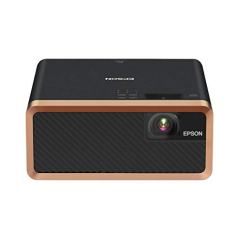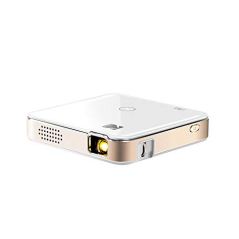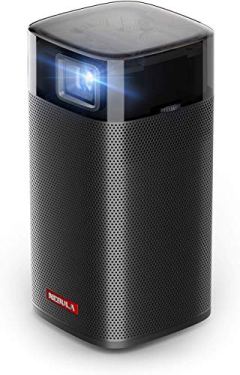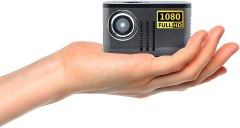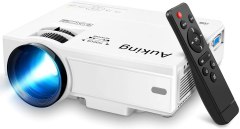Buying guide for Best mini projectors
The general rule with technology is that, after a popular new gadget comes out, it will eventually evolve and get smaller. The first cell phones were bigger than bricks, and now most models are pocket-size. Even laptops used to be enormous monstrosities, but nowadays they’re thin, light, and able to fit in any bag.
They started out as large, noisy affairs that were so expensive most consumers couldn’t afford one. Time has passed, and projectors are now more affordable and smaller than ever, giving us a brand-new product category: the mini projector.
Mini projectors are exactly what they sound like: tiny projectors that can connect to any source and create a giant image on a wall or projection screen. They are ideal to take along when you travel or if you just don’t have a lot of space. Luckily, they don’t compromise much in terms of features when compared to full-size models.
Key considerations
Before you start comparing specifications or looking at different models, start by answering these questions. They’ll point you in the right direction and help you find the right mini projector more quickly.
How big of an image do you need to project?
Projector images are measured diagonally, so start by using a tape measure on the surface where you’ll be projecting to define your ideal image size. Mini projectors can produce images that measure from 60 to 170 inches, so you have a lot of options.
Do you need a mini projector for work or home?
If you plan to use your mini projector at home, the image resolution should be a high priority so your movies and TV shows look as good as they can (we recommend getting a mini projector with a minimum native resolution of 1920 x 1080 pixels (1080p). If you’ll just be using your mini projector for work or imagery like presentations and screen sharing, you don’t need one with a high native resolution, so you can probably get by with a more affordable model.
Will you be traveling with your mini projector?
Mini projectors offer several versatile applications that you just can’t get from a standard projector, including the following:
Business presentations can be set up “on the fly” by linking your mini projector to your laptop, tablet, smartphone, or document camera. You can easily showcase websites, apps, photo galleries, and more to a group of coworkers.
You can easily bring your mini projector to classrooms, auditoriums, or other functions where you might be presenting to a group.
You can take this portable unit to a friend’s house for movie night or to the park for a group gaming session after sundown.
- Any area with a blank wall could potentially serve as a movie screen when you own a mini projector.
Mini projector features
Some mini projectors look and feel like toys, while others offer high-end features to compete with their full-size equivalents. Here are the ones to prioritize.
Native 1080p resolution
Mini projector product pages can be deceptive: most claim support for 1080p resolution, but only certain models can truly display every pixel. Look for models that state a native resolution of 1920 x 1080. That means they project an image with that many pixels by default. When a mini projector says it supports 1080p but lists a lower native resolution (like 1280 x 720, or 720p), it means it can accept a 1080p source but will downgrade it to its native resolution of 720p when projecting.
USB drive compatibility
Some mini projectors have USB ports, so you can connect a thumb drive with your favorite video and photo content for display. Whether it’s movies and shows you’ve downloaded or just your personal photo collection, it’s nice to be able to plug in a USB drive and have your content all ready to go.
Lumen count
Lumens are how projectors measure brightness. Lumen counts on mini projectors range from 100 to 1,000. If you’re going to be using your mini projector on a regular basis, we recommend getting one with at least 500 lumens so it’s adequately bright.
Mini projector prices
Inexpensive
Budget and entry-level models cost anywhere from $30 to $100. If you just need a mini projector for occasional use or for an event like a party, you’ll find a lot to like in this price range. These projectors have moderate lumen counts and typically a native resolution of 1280 x 720. If you’re not terribly picky, this is the price range to consider.
Mid-range
You'll find the best balance between function and cost between $200 and $300. Mini projectors in this price range are the real deal – they look, feel, and act like full-size projectors; they’re just smaller. If you’re looking for a mini projector that will last you several years and produce a gorgeous image, you’ll need to spend this much.
Expensive
Premium models start at $500 and go up from there. Models in this price bracket usually have high lumen counts (so they’re incredibly bright), high native resolutions (so they can natively display any video source), and, in some cases, they include an onboard operating system such as Android so you can stream content directly.
Tips
Buy a projection screen or consider using projector paint. Don’t forget that you’re going to need a projection surface! If you’re building a home theater or outfitting a conference room, pick up a projection screen. If you need a cheaper solution, consider projection paint, which is specially formulated to be reflective so you can project directly onto a blank wall.
Consider a mini projector with a built-in rechargeable battery. If you’ll be taking your mini projector with you to lots of places that may not have a power outlet, consider getting one with a built-in rechargeable battery. Some mini projectors call themselves “portable” because they’re small and include a case, but many of these models still require a power outlet, which limits their mobility. If you need a truly portable mini projector, get one that has a built-in battery. These projectors let you screen your favorite content no matter where you are.
- Consider pairing your mini projector with a Bluetooth speaker. Mini projectors often include speakers, but they don’t sound all that great, so we recommend connecting yours to a good Bluetooth speaker.
FAQ
Q. A lot of mini projectors have device compatibility lists, but I don’t see the devices I own on any of those lists. Will I still be able to use a mini projector?
A. Yes. Mini projectors use HDMI ports to connect to AV components like cable set-top boxes, game consoles, and streaming boxes. HDMI ports are generic, so your mini projector will be able to handle any source that comes in via HDMI. In the instances where you find product pages that list support for specific HDMI devices, they’re simply providing extra reassurance to consumers about compatibility.
Q. Why do product listings for mini projectors include a number of hours?
A. Most mini projector product listing include an hour count to indicate how long a typical projector bulb will last before needing to be replaced. Projector bulbs can be quite expensive, so picking the right one can make a big difference in terms of your long-term cost of ownership.
Q. What’s the easiest way to show my phone’s screen as a projector image?
A. It depends on the projector, but usually the simplest way to connect your phone to a projector is to find an HDMI adapter. One of these connects to your phone on one end (via USB-C for Android phones and via a Lightning cable for iPhones) and creates a port so you can connect a standard HDMI cable. That’s typically the most reliable method, but if you want to share your screen wirelessly, look for a mini projector that runs Android. With an Android-enabled mini projector, you can use any one of the screen-sharing apps from the Google Play store.


